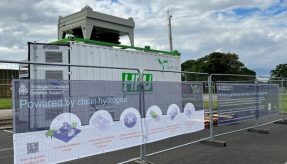
Established in May this year, the Protection of Critical Energy Infrastructures (PCEI) expert group has met at the EDA.
The project is being led by the Hellenic Ministry of National Defence, with the Ministries of Defence (MoDs) of Cyprus and Greece offering to take the lead on this project within the framework of the EDA.
Protection of Critical Energy Infrastructures has been identified as a critical area, under the Securing Energy Strategic Autonomy for European Defence (SESAED), for research and development by the EDA due to increasing importance of power and technology. The need to protect such structures for both security and financial reasons is hugely important, with an increase in terrorist attacks and emerging threats from hybrid and asymmetrical warfare, as well as vulnerability to the impacts of climate change and natural hazards across Europe.
The Consultation Forum for Sustainable Energy in the Defence and Security Sector (CF SEDSS) was jointly launched by the European Defence Agency (EDA) and the European Commission in October 2015.
The PCEI Experts Group was established to explore PCEI further from a defence point of view.
During the meeting, Group Chairman, Colonel Georgios Drosos, Head of the Infrastructure & Environment Department of the Hellenic MoD, said that the group’s main objective was “to assess how EU legislation on the Protection of European Critical Energy Infrastructure can be applied by the defence sector in a holistic way”.
He emphasised that maintenance and improvement of regional energy security and sustainability within the EU was crucial to help achieve this goal, while possible shortfalls can be addressed by developing “projects of common interest for the defence sector”.
Co-chairman of the group is Professor Athanasios Konstandopoulos, chairman of the board of the Centre for Research and Technology Hellas (CERTH), he has a specific agenda to promote collaboration between the defence sector and research community. He said: “the task of securing Energy Strategic Autonomy in a highly connected world presents challenges and creates opportunities for strengthening collaboration between the research community and the defence sector”. He called on stakeholders “to face the challenges and exploit the opportunities.”
To achieve its goals, the PCEI expert group will use the expertise of EDA Member States’ Ministries of Defence, national academic and research centres as well as EDA’s partners: the European Commission DG ENERGY, Joint Research Centre, and the NATO Energy Security Centre of Excellence.
Air Commodore Peter Round, EDA Capability Armaments and Technology (CAT) Director, stated that “EDA aims through the PCEI Experts Group to identify common capability and research shortfalls and to address them collectively to help to achieve resilience of Armed Forces in Europe.”
Denis Roger, EDA European Synergies and Innovation (ESI) Director, emphasised that “in times of crises, it is imperative to ensure the continued availability of secure and sustainable energy supplies and we are glad that EDA can contribute to this vital work by exploring the defence element of critical energy infrastructure.”
The next PCEI experts group meetings will be hosted by Cyprus in January 2017 and by Greece in March 2017. The meetings will be open to all the participating Member States of the Agency, the Agency’s partners as well as other international organisations.
If you would like to join our community and read more articles like this then please click here
critical infrastructure EDA energy Europe infrastructure research and development








